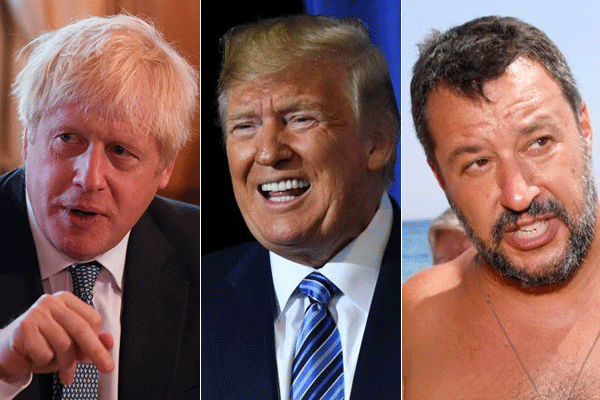Spanish companies are living one of their worst summers on the stock market for the sum of threats and uncertainties globally. To the escalation of the commercial tension promoted by the USA and an eternal Brexit that has been extended for more than three years, the rupture of the Coalition Government in Italy and the swollen defeat of Mauricio Macri in the Argentine elections have been added in recent days.
In the eye of the commercial war hurricane
The great Spanish managers have found this summer another obstacle to disconnect during their summer vacations: Donald Trump. The US president does not rest and maintains a high rate of participation in social networks, where he is able to announce from a tightening of the country's immigration policy to a new tariff missile in his commercial war with China. And the latter is precisely what frightens investors because of the impact it has on international markets.
Spain is not one of the countries most directly affected by the new CasaBlanca tariff policy. The country is affected by the announced taxes on European products, although the US is not one of the five major export markets for the Spanish company and the commercial relationship is also deficient. Nor is China, the other great player in this game of chess.
However, the fear of an increase in the conflict affects the different stock markets as a whole and stains all the squares red without distinguishing between companies. Trump's positive side for Spanish companies is his infrastructure and energy investment plans, where large Spanish conglomerates are well positioned awaiting orders.
Political crisis of the great Mediterranean partner
The political crisis unleashed in Italy has been added to the threats that come from the other side of the Atlantic to Spanish companies. The rupture of the coalition government formed by forces of extreme left and extreme right has placed the country in a scenario of maximum uncertainty that has not been slow to infect the Spanish economy by the deep economic ties that unite both countries.
Italy is the third largest recipient of Spanish exports, only behind France and Germany. But the really important thing is that the commercial relationship of both countries is favorable for Spain, with a positive balance of 1,252 million euros in 2018 supported by the sale of automotive products, fuels or olive oil, among others.
At the business level the relationship is further strengthened. Endesa, controlled by the Italian public power company Enel, Abertis - shared between the Benetton family and the construction company ACS led by Florentino Pérez - or the influence of Mediaset in Spain are just some examples of the corporate agreements that unite both countries.
In total, 93 Spanish companies have subsidiaries domiciled in Italy in very different sectors ranging from construction and energy (Acciona, Ferrovial, Iberdrola ...), tourism (Amadeus, Meliá ...) or financial (Santander, CaixaBank ...) among others.
'Brexit', the most bitter drink for Europe
Brexit has already become an eternal threat to Spanish companies. More than three years after the British voted in a referendum to leave the European Union, the country - the fifth largest economy in the world - remains mired in a latent state of uncertainty about when and especially how its disconnection process will take place with Brussels.
This will be decisive to know the exact impact that the movement will have on the accounts of the large Spanish companies located in the United Kingdom or that have London as one of their main clients. These are basically financial groups such as Santander - the largest European bank by presence in the country - or concessionaires such as Ferrovial or Iberdrola. All these companies have designed contingency plans that do not want to unveil the market until they know exactly what the process will be like now that Boris Johnson has landed on Downing Street.
But the truth is that Brexit is still one of the biggest threats to European financial markets, which rise or fall depending on the leaks over the negotiations between London and Brussels. The next big date marked on the calendar is October 31, when the deadline that the community leaders gave themselves to reach an agreed exit expires.
According to the criteria of The Trust Project
Know more- Italy
- Spain
- Iberdrola
- London
- Mediaset
- France
- Europe
- UK
- European Union
- Boris johnson
- CaixaBank
- China
- Donald Trump
- economy
- Brexit
- World
Macroeconomics Brexit uncertainty causes British GDP to contract for the first time since 2012
Macroeconomics The fall of the pound shakes Johnson's hard Brexit
BrexitThe UK debt will exceed 2 billion euros if there is no EU exit agreement

